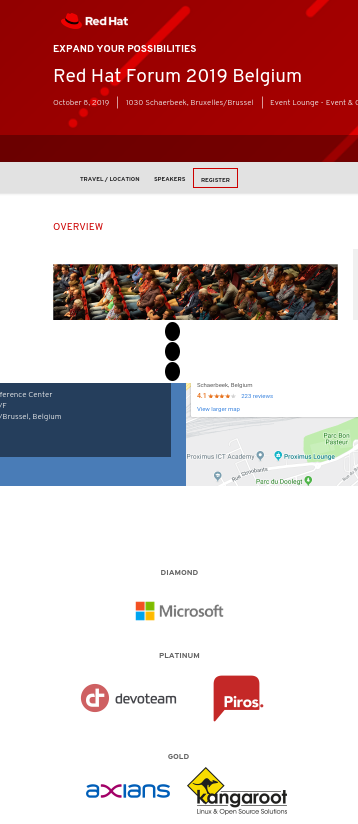

EARLIER this year we stressed that Red Hat considered Microsoft as a buyer and is nowadays running events with Microsoft, mostly funded by Microsoft. Red Hat also hired quite a few managers from Microsoft and it habitually promotes Microsoft .NET, Azure, MSVS and so on. This is beyond baffling to those of us who were led to believe Red Hat was our 'flag bearer'. To be fair to Red Hat, however, its partnership with Microsoft goes 10 years back; it started with virtualisation. It has been progressing since -- sometimes to the point of outright absurdity. We're still trying to wrap our collective heads around the IBM takeover and what it will mean for Red Hat. We last mentioned this yesterday at around noon. Then, posted at 1AM on Sunday afternoon (1PM) was this hint that Red Hat had become more like IBM (not the other way around) when it comes to patent policy, much as we predicted.
"...Red Hat had become more like IBM (not the other way around) when it comes to patent policy, much as we predicted.""In an exclusive interview," IAM wrote, "Red Hat’s IP [sic] head reveals that in the run-up to its acquisition by IBM the company went shopping for patents at a range of sellers including AT&T, Huawei and Panasonic." (behind paywall)
Well, the IAM paywall helps prevent their critics from scrutinising the text like we used to. They tend to spread many falsehoods and use intentionally-misleading terminology. But that's not the point here; the point is that Red Hat is hungry for patents, including software patents, just like IBM. It's no secret that systemd develops have also applied for (and received) patents. It's also no secret that IBM is a patent bully and its shakedown/lawsuits against companies were reported (also by IAM) as recently as weeks ago. Zillow is among the latest targets.
"We alluded to some of these patents in passing in the more distant past."Red Hat as a company (or unit) has no say on directions such as these; it's rather worrying as more "Red Hat technologies" (e.g. stuff in Linux that only Red Hat actively develops) are patented. That includes systemd patents, which we know exist (at the very least based on the applicants' names and assignee, Red Hat), but any patent on something inside systemd would not mention the software by name. We alluded to some of these patents in passing in the more distant past.
Over the past few days both good [1] and bad [2] things were said about systemd. Some have dubbed it "Open Source Proprietary Software" (OSPS) -- a catchy phrase -- and Laurent Bigonville responded to me some minutes ago to say: "If you look at the copyright claims in #systemd project, it gives me 9 lines for Red Hat et 4 lines for IBM, so much for an attempt to make it "proprietary"..." (there's a screenshot there). Bigonville is always very defensive and protective of systemd.
“A few within the BSD crowd seem so gleeful about taking RMS down, and finding creative ways to rationalize it, because then their hero Bill Gates stays out of the public eye despite his actual association with Epstein.”
--Techrights associateSuffice to say, systemd does have its merits (see below), mostly technical merits, arguably at freedom's expense (not to mention choice). What upset me personally earlier this month was seeing some senior Red Hat staff cheering the removal of Richard Stallman (RMS). Cui bono?
"Even (or especially) those tools that smugly applaud the removal of RMS based on behavior should especially object to the means by which he has been removed," an associate of ours wrote this morning. "Ends never justify the means. When it comes down to it they are supporting online lynching.
"A few within the BSD crowd seem so gleeful about taking RMS down, and finding creative ways to rationalize it, because then their hero Bill Gates stays out of the public eye despite his actual association with Epstein. It is rather disgusting that they spend so much effort attacking RMS to cover for Bill. Again, when it comes down to it, they are supporting online lynching and trying to legitimize it." ⬆
Related/contextual items from the news:
One of the things I think has generally worked well about “Linux” and the ecosystem on top of it has been the variety of userspace. There’s obviously some pointless things, but also some genuine innovation. It works well when upstream projects are structured in a way that they can be mixed and matched.
For Fedora CoreOS we are combining two technologies; Ignition and rpm-ostree. Previously they were used independently (Ignition with a ChomeOS style A/B updater) and rpm-ostree with the traditional Fedora-and-derivatives setup of Kickstart for bare metal, and cloud-init for clouds.
Putting the two together has been working well so far, but I’ve recently been working on support for root filesystem reprovisioning which is where the two projects intersect strongly. This has meant a lot of time writing code in the initramfs.
Red Hat Enterprise Linux (RHEL) incorporated systemd as their default and only init system in 2014. Soon after, perhaps with some persuasion from Red Hat and its allies, Debian adopted systemd as its default init system, and many Debian Derived distros, including all the Ubuntus, followed suit. Starting in 2014, this caused extensive protest from many in the Linux community, for reasons such as: [...]
I'll be glad to serve as a central information point for this letter writing campaign. If you find other contacts, please feel free to write to them and please email me with those contacts and contact information.